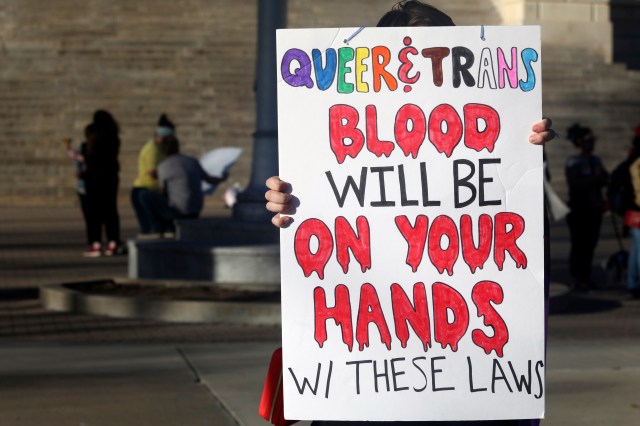
Trans Veteran Fears GOP Attacks on Rights, Iowa’s LGBTQ Sanctuary

Transgender veteran Eligh Cade, 26 years old, voices out his concerns over the escalating attacks on transgender rights by Republican politicians. The anti-transgender rhetoric, which includes proposals to ban gender-affirming care and transgender military service, has become a focal point in Republican campaigns, particularly in Iowa ahead of the Republican caucuses. High-profile Republican leaders, including former President Trump, Governor Ron DeSantis, and Nikki Haley, have made statements against transgender rights, often unsupported by evidence, linking transgender identities to a range of societal issues.
While some Republicans believe their stance will resonate with their voter base, it has resulted in distress among the transgender community in Iowa. Cade, who is employed at the Blazing Saddle, Iowa’s oldest gay bar, finds comfort within the LGBTQ community there, despite the state’s laws that limit gender-affirming care for trans children and prevent transgender students from using school restrooms that align with their gender identity.
The Blazing Saddle: A Safe Haven
The Blazing Saddle, renowned for its inclusive atmosphere, has become a refuge and support system for many, despite being yet to be visited by any Republican candidates. The bar has, on the other hand, been a stopover for Democratic politicians during previous campaigns.
2023 was marked with a record number of anti-LGBTQ bills, particularly those that limit medical care for transgender youths and adults, being considered by Republican-led state legislatures. Several states propose to restrict or strengthen limitations on puberty-blocking drugs, hormone treatments, pronouns, sports teams, bathrooms, drag performances, and school curriculums for transgender individuals.
Major medical groups stand against these bans, affirming that the care is safe when administered appropriately. However, conservative efforts to target the rights of transgender minors by putting measures on the ballot are in progress. Nationally, challenges to existing laws are moving closer to the U.S. Supreme Court, with the ACLU requesting the court to block restrictions on care for youths in Kentucky and Tennessee. The 8th U.S. Circuit Court of Appeals is also considering Arkansas’ request to reverse a ruling that struck down the state’s ban on gender-affirming care for youths.



